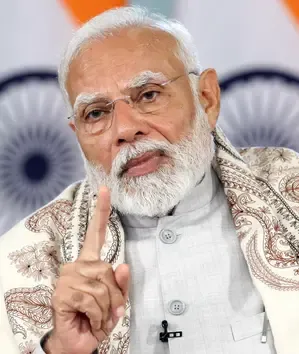Major Advancement for Jute Farmers: PM Modi Announces MSP Increase

Synopsis
Key Takeaways
- MSP Increase: Raw jute MSP raised to Rs 5,650 per quintal for 2025-26.
- Support for Farmers: Aims to benefit millions of jute farmers nationwide.
- Significant Growth: MSP rose from Rs 2,400 in 2014-15 to Rs 5,650 in 2025-26.
- Economic Security: Provides fair prices and financial security for jute farmers.
- Trade Impact: 40 lakh families depend on the jute industry.
New Delhi, Jan 23 (NationPress) Prime Minister Narendra Modi announced on Thursday that the government has made a crucial advancement to support farmers in the jute sector, particularly in West Bengal, by endorsing an increase in the Minimum Support Price (MSP) for raw jute for the 2025-26 marketing season.
On X, PM Modi stated, "Our administration has made a significant move in favor of our jute-producing farmer community nationwide. The MSP for raw jute has been raised for the year 2025-26. This decision will positively impact millions of farmers involved in this industry across various states, including West Bengal."
The Cabinet Committee on Economic Affairs (CCEA), led by PM Modi, has set the MSP for raw jute (TD-3 grade) at Rs 5,650 per quintal for the upcoming 2025-26 season, ensuring a 66.8 percent return over the all-India weighted average cost of production.
This marks an increase of Rs 315 per quintal from the MSP for the 2024-25 marketing season. The hike is consistent with the government's commitment to set MSP at a minimum of 1.5 times the weighted average cost of production, as articulated in the 2018-19 Union Budget.
Under the current administration, the MSP for raw jute has seen a remarkable rise, from Rs 2,400 per quintal in 2014-15 to Rs 5,650 per quintal for the 2025-26 season, signifying a 2.35 times increase of Rs 3,250 per quintal.
Approximately 40 lakh farm families rely directly or indirectly on the jute industry, with around 4 lakh workers employed in jute mills and trade. Last year, jute was sourced from 1.7 lakh farmers, with 82 percent of jute farmers located in West Bengal and the rest from Assam and Bihar, contributing 9 percent each to national production.
The Jute Corporation of India (JCI) will remain the designated agency for Price Support Operations, with the Central Government fully compensating any losses incurred during these operations, as stated.
The official statement emphasized the differences in payments made to jute farmers across the years. From 2014-15 to 2024-25, the total amounted to Rs 1,300 crore, compared to Rs 441 crore from 2004-05 to 2013-14.
This decision underlines the government's dedication to the welfare of jute farmers and is anticipated to fortify the sector by ensuring fair pricing and enhanced financial stability.









